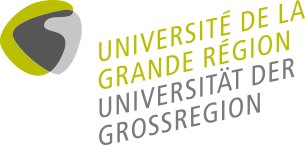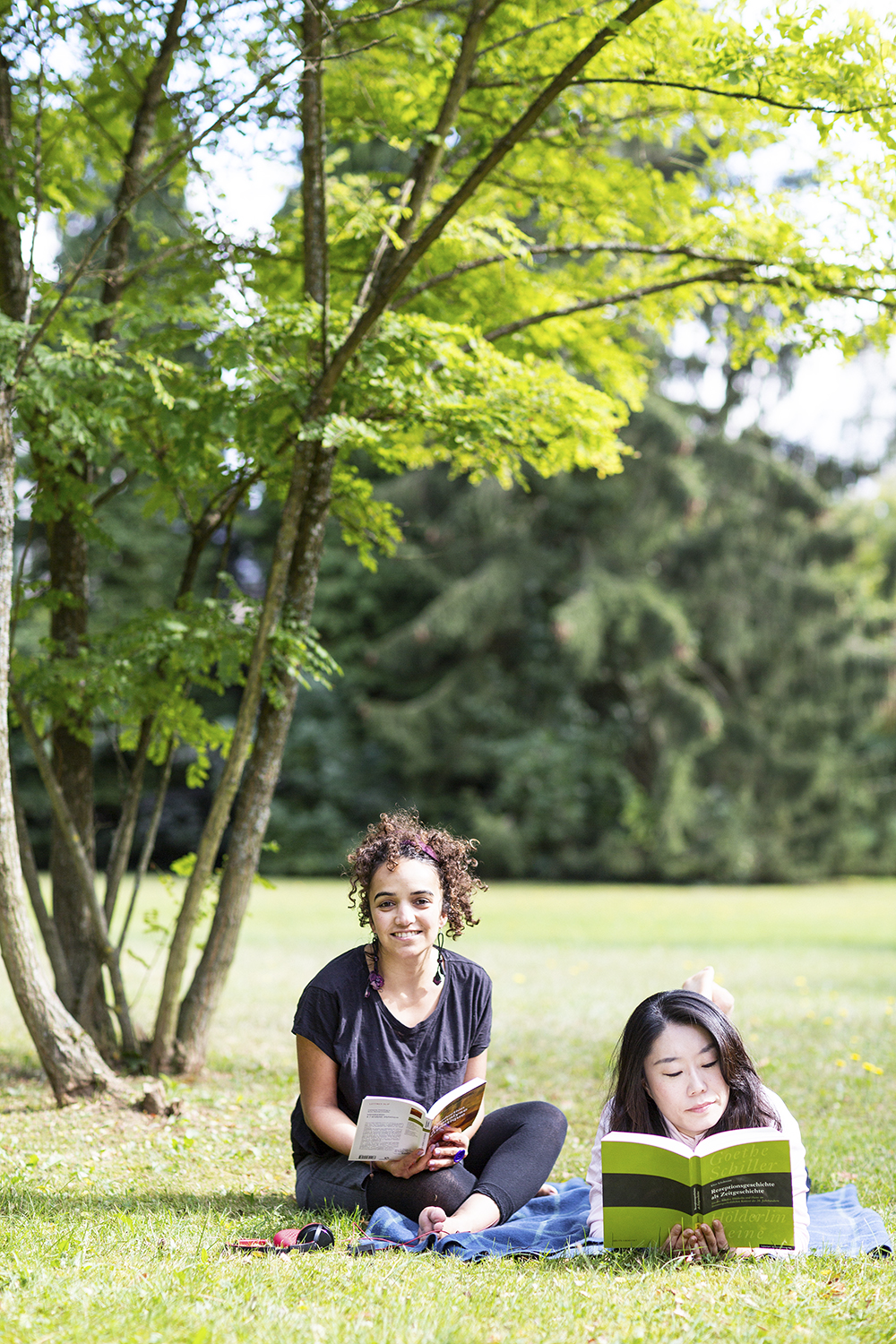The floor is given to students. Here are their testimonies, of their cross-border studies as well as their mobility experiences through the UniGR. Enjoy the reading !
If you would like to share your UniGR experience, feel free to contact us.
Trinational "Master in Literary, Cultural and Language History of German-Speaking Regions"
16.08.2017 – Interview with Julia Monsees, student of the Trinational Master in Literary, Cultural and Language History of German-Speaking Regions at the universities of Luxembourg, Saarland and Lorraine
Julia Monsees studies three specializations at three universities in three different countries: The Trinational Master of the University of the Greater Region is about literary, cultural and language history of German-speaking regions. Courses are held simultaneously at Saarland University, University of Luxembourg and University of Lorraine. For "abi.de" (interview in German, no longer available online), the 26-year-old student is sharing her experiences.
12.12.2016 – Interview with Laura Zaccaria, student of the Trinational Master in Literary, Cultural and Language History of German-Speaking Regions at the universities of Luxembourg, Saarland and Lorraine
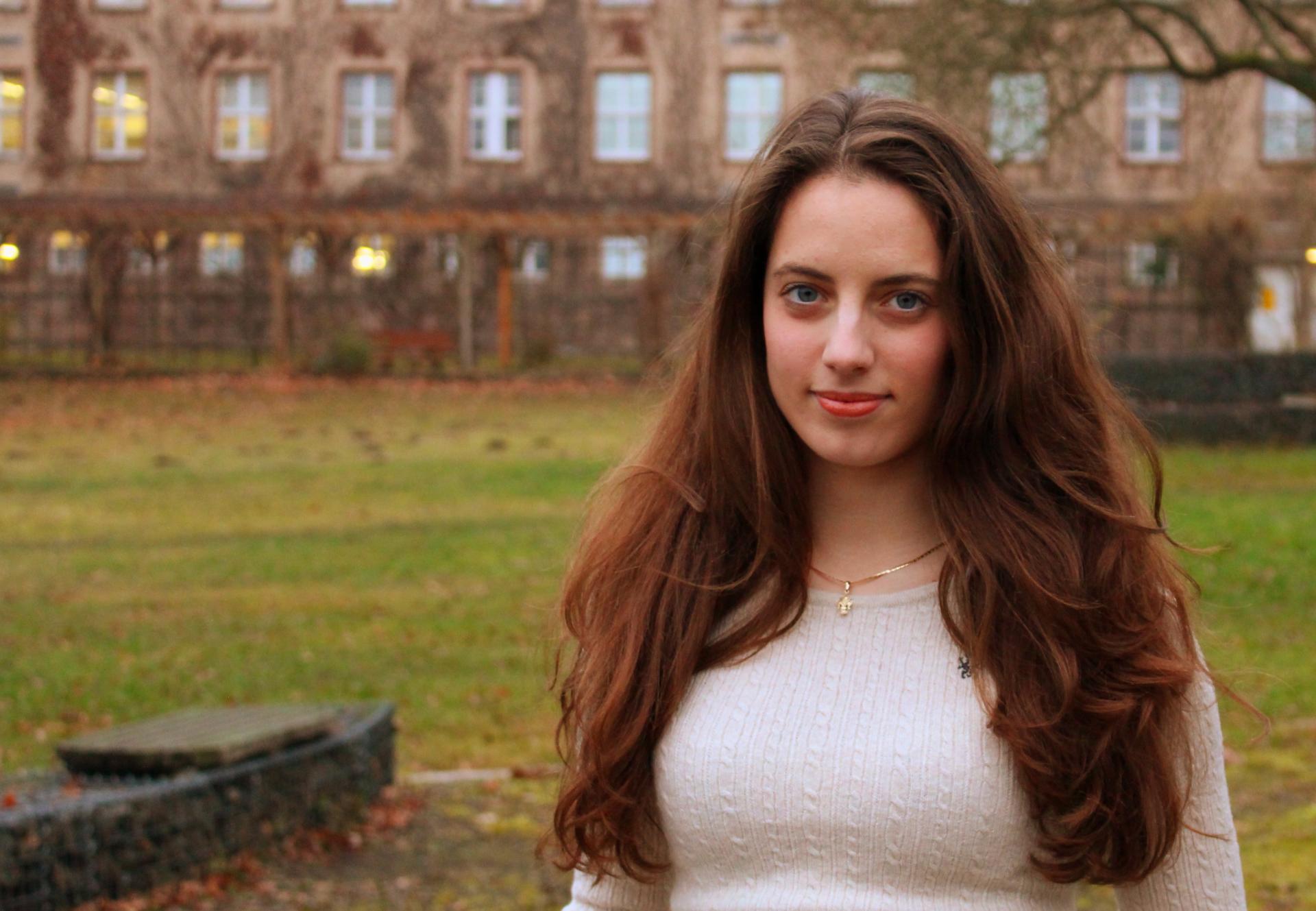 UniGR: How did you learn, within your Master’s programme, about the study possibilities of UniGR?
UniGR: How did you learn, within your Master’s programme, about the study possibilities of UniGR?
Laura Zaccaria: "At the beginning of my studies, I have been informed by my director of studies about the UniGR and its services within the framework of the trinational Master’s programme. The speciality of this programme is that it has been conceived from the outset to the cross-border study possibilities in the Greater Region. The Master’s programme is offered in common by the universities of Luxembourg, Saarland and Lorraine and benefits completely from the wide study offer of the UniGR-network."
UniGR: Why did you choose the trinational Master’s programme after your Bachelor degree at the University of Luxembourg?
Laura Zaccaria: "There have been several reasons for me to choose such an international study programme, even if the University of Luxembourg is already known for its intercultural and multilingual orientation. Because I was very satisfied with the Bachelor’s programme in Luxembourg and because I didn’t want to forego the experience abroad, this cross-border Master’s programme was the appropriate choice for me – precisely because living in a small country like Luxembourg and having a geographical proximity with the foreign partner universities was a chance to benefit from their wide course offers. The fact that I can obtain with this Master’s programme the degree of three universities constitutes a significant added value for me. Furthermore, I have the possibility to write my master thesis as a sort of cotutelle by choosing a supervisor at my home university and one at one of my partner universities. This brings me the advantage to benefit from the knowledge of different supervisors."
UniGR: How do you commute to go to your hosting universities?
Laura Zaccaria: "In order to obtain the triple degree, I have to complete at least 30 credit points at each university, which correspond approximately to five courses. Accordingly, I commute each semester one or two times per week to Saarbrücken and/or to Metz. For this reason, it was a great help for me to benefit from the UniGR Mobility Fund. To facilitate the mobility of its students, the UniGR reimburses a large part of the travel costs at the end of the semesters, regardless of the used means of transportation." (Editor’s note: flat-rate basis, see conditions here).
UniGR: How do you feel about being in three different academic systems?
Laura Zaccaria: "A great enrichment of this trinational study programme is that not only the multilingual and intercultural skills are promoted, but also the adaptability to the different academic systems. You discover the different research and teaching methods of the universities. All of this becomes more important in the time of globalisation and increases the career opportunities. However, the simultaneous studying at three universities from three different countries requires of course more self-organisation. Nevertheless, the directors of studies as well as the UniGR-employees help you make the mobility as uncomplicated as possible, so that you have time to concentrate on the courses. On the UniGR website you can find a special course offer from the three universities specifically suited to the trinational Master’s programme, so that you don’t have to consult the whole course catalogue of the three universities at the beginning of each semester. This extremely facilitates the course choice. Moreover, the creation of a learning agreement is superfluous in this Master. In addition, there are often block seminars offered by the hosting universities, so that you don’t need to travel abroad every week. All of this facilitates the simultaneous studying at several universities."
UniGR: What do you plan to do after your studies?
Laura Zaccaria: "After my degree, I intend to work in the publishing sector or in a communication department of a cultural institution. This must not necessarily be in Luxembourg. I can also imagine pursuing a cross-border career and so I will look for job offers within the Greater Region."
UniGR: Would you recommend the UniGR student status to the other students of the University of Luxembourg?
Laura Zaccaria: "Because not only the students of the trinational Master’s programme can benefit from this cross-border course offer but all the students of the university, who want to complete a mobility at one of the five other universities of the UniGR-network – either for one or more courses – I strongly recommend the UniGR student status. It offers the possibility to recognize the taken courses at the home university and you get a student card from the hosting university with which you can use the canteens and libraries without paying additional tuition fees. Furthermore, the UniGR staff helps you with the organisation of the mobility."
Binational "Master in Theatre and Intercultural Studies"
06.04.2017 – Interview with Sascha Dahm, student of the Binational Master in Theatre and Intercultural Studies
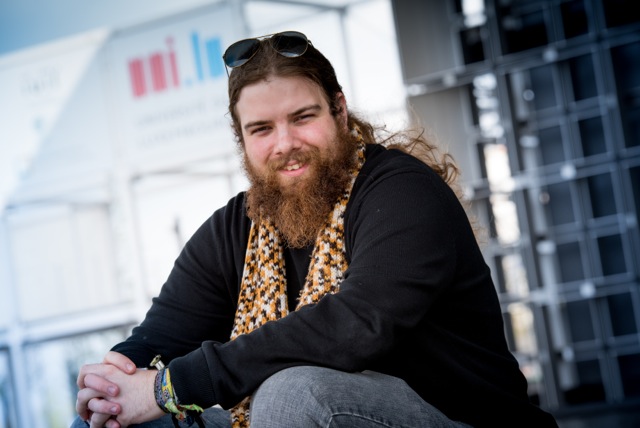 Natalie Bloch: What special area of interest made you opt for the binational Master's in Theatre and Intercultural Studies after completing your Bachelor's degree at the University of Luxembourg?
Natalie Bloch: What special area of interest made you opt for the binational Master's in Theatre and Intercultural Studies after completing your Bachelor's degree at the University of Luxembourg?
Sasha Dahm: "I very quickly decided that I wanted to carry on studying at the University of Luxembourg after my Bachelor's degree. Many of the new Master's programmes at the University of Luxembourg corresponded to my interests, especially the Master's in Theatre and Intercultural Studies. The combination of the two main subject areas of theatre and interculturalism aroused my curiosity because I had already been very interested in those fields during my Bachelor studies. As I have already had the possibility to gain some practical experiences in a theatre, I am pleased as well to extend my knowledge and experience on a theoretical level."
Natalie Bloch: You are now in your 2nd semester – are you able to give us already an initial report?
Sasha Dahm: "The conclusions I can draw are entirely positive. I have the feeling that the course directors have put a great deal of effort into putting together a varied degree programme. It is also pleasing that the relationship between lecturers and students is a very good one and that the suggestions and wishes of the students are noted and – wherever possible – implemented."
Natalie Bloch: What, in your opinion, is special about this degree programme?
Sasha Dahm: "For me, what’s special is the combination of theatre’s and intercultural studies’ subjects which, so far as I know, is not available at any other university. Especially in Luxembourg and in the Greater Region, we experience interculturalism on an everyday basis. Taking this specificity into account, the theatres offer different approaches to address linguistic and cultural diversity. So in a microcosm like the Greater Region, this course programme perfectly reflects the different social realities. A work placement that is an integral part of the cursus, and which can be carried out at any Greater Region’s theatre, gives students the opportunity to gain their first practical experience."
Natalie Bloch: In addition to the academic seminars, the course programme also offers practical seminars and workshops. What have you experienced so far on a practical level?
Sasha Dahm: "For me, the practical seminars and workshops are a key part of this degree programme and they balance out the theoretical seminars perfectly. Working with playwrights, cultural managers and actors gives students a real insight into theatrical and cultural processes. The workshop with the dramatist Katja Hagedorn ("Rimini Protokoll") clearly showed us how complex it is to develop a suitable concept for the theatre. The current practical seminar led by Hermann Lewen (former Director of the Mosel Music Festival) allows us to understand how in a concrete way we can set up a festival and manage it. The aim of these seminars is to acquire new competencies which will be essential for a future career in culture or theatre."
Natalie Bloch: What, for you, is the added benefit of studying at two universities?
Sasha Dahm: "Studying at two universities means studying in two different systems. It enables students to learn about new methods and fields of research which they may have been unaware of before. So the main additional benefit is the complementary range of subject areas; the University of Luxembourg works mainly with European theatre, whereas the University of Trier focuses on Asian theatre, for example."
Natalie Bloch: How do you get to the partner university in Trier?
Sasha Dahm: "In order to get the binational degree, I have to attend a certain number of courses at the University of Trier. It means that, for each semester, I commute once or twice a week to Trier. The Mobility Fund of the University of the Greater Region (UniGR) is a big help in facilitating mobility for students because at the end of each semester it reimburses you most of your travel expenses, regardless of which form of transport you used."
Natalie Bloch: What would you like to do for a career?
Sasha Dahm: "Personally, I can imagine myself having a job in the teaching or cultural sector or in cultural management. The key thing for me is to be able to remain involved in the theatre in my later life and be able to integrate it in my professional career."
12.04.2017 - Interview with Rina Galani, student of the Binational Master in “Theatre Studies and Interculturality" at the University of Luxembourg, 2nd semester
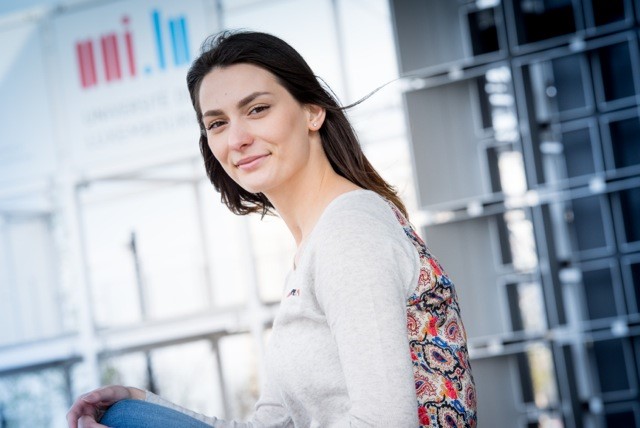 Natalie Bloch: After completing your Bachelor’s degree at the University of Luxembourg, what made you decide to continue with the Theatre Studies and Interculturality binational Master programme?
Natalie Bloch: After completing your Bachelor’s degree at the University of Luxembourg, what made you decide to continue with the Theatre Studies and Interculturality binational Master programme?
Rina Galani: "There were several reasons why I decided to continue studying this new Master programme. First of all, in the course of my BA studies at the University of Luxembourg, I found the fields of “Theatre Studies” and “Interculturality” extremely interesting, although until then, I did not have any experience with this yet. Subsequently in my own life, the subject of interculturality also became important to me, therefore I could only consider a degree programme that would allow me to work later on in this field. The leap from going to the theatre on a regular basis to actually studying Theatre Studies only happened once I realised that my interest in the theatre went far beyond my position as a spectator. While following lectures on theatre and during my Erasmus stay in Vienna, I realised that I was very interested in issues concerning theatre and its underlying processes. Therefore, a course that offers this unique mix of interculturality and theatre studies was from a textual point of view absolutely perfect for me.
However, it was not just the Master’s content, which determined my decision. As is the case for many other students too, after my BA I was also faced with the question as to whether I should do my Master here or abroad. As I could not really make my mind up, this binational Master has provided me with an excellent solution as it combines both. Furthermore, I was really attracted by the possibility of doing a longer work placement where I am able to decide myself the direction I want to go in."
Natalie Bloch: You are now in your 2nd semester – are you able to give us already an initial report?
Rina Galani: "Before beginning my studies, my interest in theatre studies was considerably greater than my knowledge of the subject. I had doubts as to whether I knew enough to be able to cope with the course of study. However, early on in the first semester I was relieved, because I saw that the programme adapts itself to the students’ level of knowledge. Despite being largely devoted to theory, the introductory courses were designed to be very interesting as they introduced us to many different examples of theatre productions. Much room was left for discussions and exchanging ideas, thereby ensuring that nobody found these theoretical seminars too straight. The practical seminars in particular provided plenty of variety and offered me a great opportunity to gain experience in various areas of theatre. So far in the second semester, I have found a very wide choice of options, ranging from ancient to contemporary theatre. What I also consider to be remarkable is that all students are individually supervised and a real interest is taken in our opinions and our needs. This is due to the good communication with the lecturers leading the Master programme. What I have personally become aware of is that this Master being a binational programme demands from me to plan my time carefully and to be well organised."
Natalie Bloch: What in your opinion makes this study programme special?
Rina Galani: "As far as course content is concerned, I think that what is unique is the interdependence of “interculturality” and “theatre studies”. For me this was a crucial factor which influenced my decision. By studying in two universities at the same time, interculturality is not only taught – you actually get to experience it personally. However, the fact that the programme is practice-oriented was the most enriching aspect for me. To find such a practical focus on an academic Master is not something that can be taken for granted, especially the fact that students are involved in planning the practical seminars and their interests are taken into account."
Natalie Bloch: The curriculum also offers practical seminars and workshops alongside the academic seminars. What has been your experience so far of these practical course components?
Rina Galani: "Since before I started the Master my main contact with the theatre was as a spectator, the practical seminars and workshops have opened up a completely new level of experience for me where I can test my own abilities and where I have discovered new interests and skills. Having direct contact with experienced theatre producers, actors and cultural managers also offers an opportunity to ask questions about their work experience in the theatre and to get immediate feedback from these experts concerning your own work. In addition to that, given the diversity of the seminars, I have gained insights about how varied the world of theatre is. This is particularly helpful for me because I do not know yet exactly what I want to do in the future, so in this way I am able to get a good oversight. Whereas, for example, in the first semester the practical seminar with Katja Hagedorn, dramatic adviser of Rimini Protokoll, was more focused on the artistic aspects of theatre, in this second semester we are now dealing with cultural management and organisation."
Natalie Bloch: For you, what is the added value of studying at two universities?
Rina Galani: "As far as I am concerned, despite the commuting which can be tiresome at times, studying at two universities at the same time offers many advantages. Firstly, it is a fantastic opportunity to combine two fundamentally different spheres of study experience – the one in your own country and in another one. For me especially, this was a great advantage because it was hard to choose between the two. With regard to interculturality, it is also interesting that you are not only dealing with this issue on a theoretical level but you become part of an intercultural exchange by overriding boundaries of various countries, academic cultures and university systems. For me, a further plus point is that being a binational Master student at the University of Trier also means that I can take advantage of the courses they offer in closely related disciplines."
Natalie Bloch: How do you commute to our partner university in Trier?
Rina Galani: "First of all, I think it’s important to mention that not all the courses which are offered in Trier also have to be done in Trier. For many courses there are alternatives available in Belval. Nevertheless, if you want to successfully complete this binational Master programme you have to be prepared to commute from Belval to Trier. Bearing this in mind, I find it really handy that a bus is provided from Belval to Trier every half hour or hour – depending on the time of day. It just becomes somewhat trickier if the courses only take place later in the evening. As this was the case for me particularly during my first semester, I always travelled with a fellow student. Financially, every student can afford to commute because the University of the Greater Region (UniGR - Mobility fund) reimburses travel expenses at the end of each semester, regardless of which means of transport you use."
Natalie Bloch: What do you want to do for a living?
Rina Galani: "At this point in time I do not know yet what I’d like to do for a living. I did not set out on this course with a particular career goal in the back of my mind; it was much more about pursuing my personal interests. For me it’s important to first find out which area I would like to be involved in the future by going to a wide range of lectures, practical seminars and workshops, so that I can gain further experience in this specific area when I do my placement at the end of the Master."
To see the video of this interview, please click here.
Trinational "Master in Border Studies"
UniGR student status
Interview with Camilo Barrero from Colombia, student of the programme “Historically oriented cultural studies” at the Saarland University, 4th semester
During his study time at the Saarland University, Camilo Barrero used the UniGR student status to attend seminars at the University of Luxembourg and to improve his multilingualism.
He appreciated the support of the UniGR staff concerning the organization of the mobility as well as the possibility of reimbursement of the travel costs through the UniGR mobility fund.


